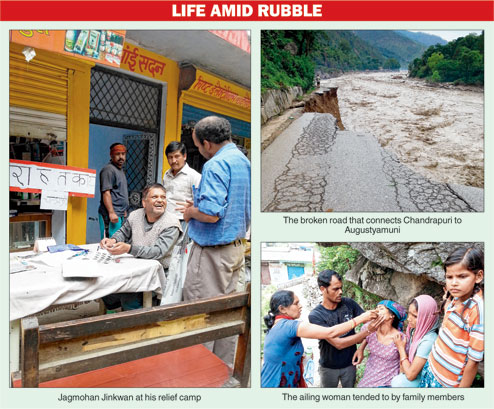 |
Saritha Thomas, director and managing trustee of People’s P.o.w.e.r Collective, a non-profit organisation working to take community radio to villages, was in Uttarakhand with two members of her team to train local residents when disaster struck. A city girl’s account of the devastation and people’s struggle
We reached Prithviraj Nagar, a village by the Mandakini river, on June 1, with a fortnight in hand before we started training the local people for our Participatory Ownership Empowerment Radio project.
Our first day’s training on June 17 turned out to be a no-show as it had been raining heavily since morning.
Our host Manvendraji (Manvendra Singh Negi, the secretary of Mandakini Ki Awaz Samudayak, a local community-based organisation and our partner in Uttarakhand) looked worried. The mountain streams were flowing down at a great speed and, he said, if the water did not change direction, the houses could be in danger. A little later, I accompanied Manvendraji and his neighbour Jitendra to the river. We got to work with axes and other tools, digging up soil, and managed to divert the water into the forest.
By evening, news started trickling in that Chandrapuri, 18km away, had been destroyed in the floods.
The next day, Manvendraji and I walk to Chandrapuri as the roads had been washed away and it was not possible to take a jeep.
When we reached Chandrapuri, after a three-and-a-half-hour walk, there were people screaming and crying all around us. It was hard to imagine that there had been houses and shops there once. The entire market had been washed away. The people of Chandrapuri had just five minutes to run for their lives, after the unnatural sounds of the swelling river served as a warning. People ran up the mountain in fear but some fell from that height because of lack of oxygen.
Over the next two weeks, we walked up to Chandrapuri several times. On one such trip, we came across a family desperately searching for a hospital. The wife was suffering from diarrhoea and was severely dehydrated. Her husband was carrying her in his arms while her kids held an umbrella over her head to protect her from the rain. They ran up the mountains, pleading with people to call an ambulance. The ambulance could only come till Kandara because the road from there had been washed away. So the man had no choice but to carry his wife all the way.
I was shocked to hear that a public health unit in Kunja has not been in operation for eight years. Augustyamuni is the nearest village with a health centre but all roads leading to the centre have been washed away. So, villagers have no choice but to travel more than 20km to Pokhri, which has a hospital.
Another villager, Kamla, helped a woman in childbirth. The baby was stillborn but the mother survived.
If there were tales of despair, there were some of hope too.
Jagmohan Jinkwan, a resident of Chandrapuri who lost his home and shop to the flood, set up a relief camp with his last reserves.
All that was left of his shop after the flood were a few sacks of rice and dal. The ex-army man, along with his brother, cooked and fed the flood victims all day and night till his stock of rice and dal dried up.
The markets, too, are running out of foodgrain. Umadi, Manvendraji’s wife, went to the market a few days ago to buy rice but none of the shops had any. The scarcity has already begun.
Shiv, a resident of Chandrapuri, came all the way to Prithviraj Nagar in search of food some days ago. He was starving for four days and had no choice but to drink water from the Mandakini river even though he was aware that the water was contaminated with bodies floating in places. He could still smell the stench.
Located atop a hill, Prithviraj Nagar had escaped the river’s fury, but not fear of losing loved ones. Almost every family had someone working as labourers or vendors at Kedarnath.
A Nepali family next door had no news of their three sons, one of whose wife is three months’ pregnant, for five days. They had given up hope when the sons finally arrived. As the family celebrated the homecoming, there were many others still sitting for their brothers, fathers or husband.
Though our training programmes have been deferred till the weather and conditions look up, the devastation has made people realise the need for community radio. There were so many people who came up to me saying “Didi, kash hum logo ke paas community radio hota (Didi, if only we had a community radio service)”. We will be back in a few months and hopefully be able to help them before nature unleashes its fury once again.










